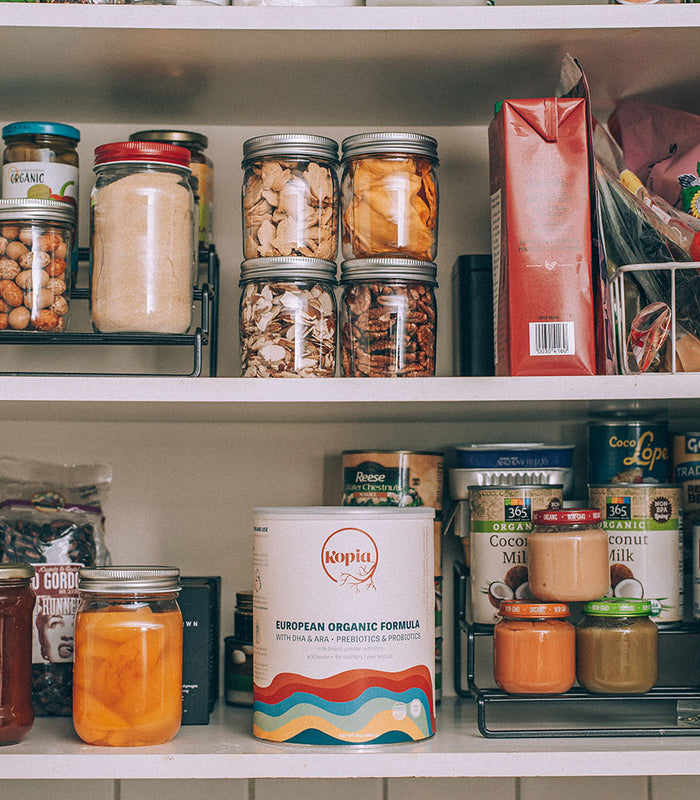Light reading for late night feedings

Why We Manufacture in Europe
While most food companies use cost as their driving motivator, our goal is to make products of the highest possible quality, with the highest possible nutritional value. Our sourcing and manufacturing standards are very strict. Beyond being certified organic and non-GMO, we test for glyphosate, pesticides, herbicides and heavy metals to limit chemical exposure promoting a healthy gut from day one. With these standards in place, we found that sourcing ingredients that met those standards were more easily available in Europe due to their strict regulations for agriculture and food.

Formulated for Gut Health
Gut health is about more than just prebiotics and probiotics. Gut health has been a marker for chronic disease and is said to be the number one reason why our children are continuing to get sicker, even as technology advances. Eating organic and limiting the chemicals we ingest can be important to improving gut health which is exactly why we have sourced and formulated the way we have.

Modeled After Breast Milk
We find the notion of using “Modeled after breast milk” as a marketing tagline to be strange. As a baseline shouldn’t all infant & toddler formulas be modeled after breast milk? We started with that as a core principle for our formulation and filled in the critical nutrition with quality ingredients that mimic the vitamins and minerals naturally present in breast milk.
MACRONUTRIENTS
Simply put, macronutrients are the compounds we need more of. That’s why we’ve carefully sourced these essential nutrients because nothing is more important than your child’s health.

Protein
Organic casein and native whey are the fundamental protein sources in Kopia. We believe it is vital these come from grass-fed cows without added hormones or antibiotics. Our whey is native meaning it is minimally processed without the byproducts from the cheesemaking process to preserve the most beneficial nutrients from the milk. The ratio between our organic casein and native whey is 40/60, mimicking breast milk which is whey dominant.

Carbohydrate
Organic lactose is the primary carbohydrate source in the formula and mimics mothers’ milk in which lactose is the sugar.

Healthy Fats
Organic vegetable oils, organic milk cream, and DHA & ARA provide necessary fats for baby and comprise a ratio that’s as close to breast milk as we could make it. Additionally, DHA & ARA are long chain fatty acids that assist in brain and eye development as well as building your baby’s nervous system.
Micronutrients
Though micro, these nutrients have a big job. Scroll through to read more about the mineral compounds and vitamins that we include for your child’s health and development.

PREBIOTICS
Breast milk contains abundant amounts of prebiotics or human milk oligosaccharides (HMOs) which ensure that Bifidobacterium species in a baby’s belly are promoted among other important functions like improving digestion. Found naturally in our dairy products and certified organic, our FOS/GOS mixture may aid in digestion and microbiome health.
PROBIOTICS
The strain of probiotic found in Kopia is Bifidobacterium animalis subsp. Lactis HN019. Probiotics naturally support nutrient absorption and digestion by combating bloating and gas while promoting a healthy immune system. Our probiotics are manufactured using a proprietary process where the probiotic has a distinct stability advantage meaning you’ll maintain more probiotics, longer.
What We Avoid
What we don’t use is just as important as what we do. We’re committed to avoiding ingredients that may be harmful to the overall health of ourselves and our little ones.

A Note on Maltodextrin & Soy Lecithin
Maltodextrin
Maltodextrin is used in Kopia formula specifically as a carrier for micronutrients. Essentially, the maltodextrin encapsulates the vitamins and minerals and aids in the proper delivery and optimal absorption. The amount of maltodextrin in our formula is very low and not used as a sweetener. In fact, the dextrose level doesn’t even classify it as such.
Soy Lecithin
Soy lecithin is often perceived as artificial but lecithin is actually found naturally in soy. The biggest issue we (and others) take with it is that the extraction process can introduce unwanted chemicals and it’s often derived from non-organic, gmo soy. We offset this by using organic and non-gmo soy and batch test our ingredients for chemicals. Soy lecithin is used as a natural source to ensure your baby’s formula is creamy and consistent every time you make it.
What We Test For
We live in a world where we’re constantly exposed to toxicants, radiation, and heavy metals that can compound overtime impacting our health. While it’s impossible to avoid entirely due to the environment humans have created, we believe in complete transparency and test for and report on over 200 different toxicants and heavy metals. Here are the big ones:
Fluoride
Although we don’t add fluoride to our formula and source ingredients from Europe where they have banned fluoridation in public water, fluoride is nearly impossible to avoid. We batch test for it so that you know exactly what levels are naturally present.
Heavy metals
Heavy metals are natural elements that can be toxic even at low levels. They’ve been known to be found in common foods like brown rice. We avoid ingredients naturally high in heavy metals and test for the main four which are lead, arsenic, mercury and cadmium.
Glyphosate, pesticides & herbicides
Glyphosate has been banned in much of Europe including the countries we source our ingredients from. While organic products are not permitted to use non organic chemicals during the farming and harvesting process, glyphosate has been known to be found in our air and water due to its widespread usage, especially in the United States. While glyphosate is our focus, we also batch test for many other pesticides and herbicides.












